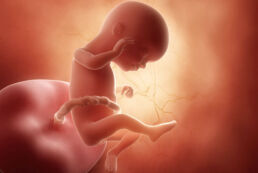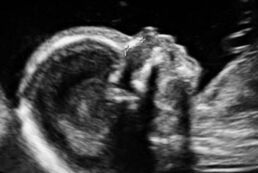Baby's Height and Weight
In the 16th week of pregnancy, the baby is 11-12 centimeters tall, about the size of an avocado. Is weight is about 360 grams.
Development of the Baby

At the 16th week of pregnancy, your baby’s muscles, bones, and nervous system continue to develop.
Their bones, which continue to harden, will be flexible until birth for a comfortable birth.
Her nails continue to grow. His skin gradually thickens.
During the 16th week of pregnancy, your baby continues to make various facial expressions such as surprise, sadness, frowning and smiling. Don’t worry, it’s not his real emotional reactions, he does them involuntarily. You can think of them as a kind of mimic experimentation and exercises, such as a facial muscle exercise.
Your baby can make grasping movements with his/her hands. They can even join hands and clamp or grasp the umbilical cord.
The strands of hair begin to thicken.
During the 16th week of pregnancy, your baby continues to swallow amniotic fluid and pass it through the digestive tract and urinate. And this continues until birth.
Hundreds of thousands of eggs are formed in the ovaries of baby girls this week.
At 16 weeks, the baby can kick in the womb with its tiny feet.
At the 16th gestational week, her eyes become more sensitive to light. His ears have begun to hear.
The placenta, which completes its development at 12-13 weeks, is a structure that allows the baby to breathe, feed and produce feces. It also protects the baby from infections. It works as fast as an organ and consumes energy. For this reason, there is plenty of blood flow to the placenta. As the fetus grows and its needs increase, the placenta will also thicken. At the end of the 16th week, the placenta is about 1 centimeter thick and has reached about 7-8 centimeters in length.
At 16 weeks of pregnancy, the baby’s tooth buds start to become more prominent.
Ultrasound Image

In the 16-week gestational ultrasound images, it is seen that the baby’s facial features become more prominent. Baby’s feet are longer than arms and body is still slim.
Can the Sex of a 16-Week Baby be Identified?
If the doctor has not been able to identify your baby’s gender before, he/she can make a large gender prediction this week. However, some babies do not allow this because of the position. If your baby is a boy, your doctor is likely to be able to see the gender. For this reason, do not be disappointed if your doctor cannot tell the gender at 16 weeks.
Can a 16-week-old baby's movements be felt?
At 16 weeks pregnant, you can feel your baby move! Its little kicks feel like the flapping of a butterfly’s wings. In general, the baby’s movements are felt around the 16th week in the second or third pregnancies. If it’s your first baby, it’s normal that you still don’t feel the movements, you can probably feel them after 20 weeks.
Changes in the Mother's Body
At 16 weeks of pregnancy, the weight of your uterus is about 230-250 grams.Between 16 and 20 weeks of pregnancy, your doctor may recommend the Triple Test or the newly developed Quadruple Test. The difference between the Triple Test and the Quadruple Test is that the Quadruple Test includes more extensive screening. If no risk has been identified in your Dual Test, your doctor may not recommend these tests. These tests evaluate the baby’s risk of having Neural Tube Defects, Down Syndrome or other Chromosomal Defects, along with factors such as your age.
Triple Test and Quadruple Test do not pose a risk. In this test, if the risk of a genetic problem is detected, the doctor may recommend additional tests such as amniocentesis to the expectant mother. Although these tests increase risk estimates, they can sometimes give erroneous results and may involve risks for the baby. The decision on this matter is left to the parents.
Since there may be tension and stretching in the muscles around the uterus, you may feel groin pain at 16 weeks of pregnancy.
If sugar is detected in your urine at 16 weeks of pregnancy, your doctor may order a blood test and an oral sugar loading test to find out the ratio of your blood sugar. Today, the sugar loading test is among the routine tests, but it is performed with the approval of the expectant mother. Performing the test is of great importance in terms of detecting gestational diabetes. Because gestational diabetes can cause the baby to be born overweight and cause some risky situations for the health of both the mother and the baby. A diet in which sugar intake is kept under control is recommended to expectant mothers whose gestational diabetes is detected, and restrictions are made on sugar-containing foods.
In 97 percent of expectant mothers diagnosed with gestational diabetes at 16 weeks of pregnancy, blood sugar returns to normal after delivery. Expectant mothers with detected gestational diabetes should have regular doctor checks and comply with diet programs.
Points need to be considered
Pay attention to your weight gain as your appetite may increase during these weeks. If you pay attention to sugary and carbohydrate foods and don’t overeat, you won’t gain much weight.
You may not feel beautiful with your stomach swelling every day. But rest assured, the fullness of your face and lips and the glow of your skin will make everyone, including your partner, think you are very beautiful. You’ll feel great if you strive to be as caring and attentive as ever.
At 16 weeks of pregnancy, both the effect of the hormone progesterone and the pressure your uterus puts on your intestines cause the intestinal muscles to become lazy, which leads to constipation. This does not mean, of course, that all expectant mothers will be constipated. Generally, 1 in 2 pregnant women experience constipation. Eating plenty of fiber, drinking plenty of water and moving around are the best solutions for constipation.
Canbebe on Social Media!
Join our community of mothers and fathers on social media. Be close to caring community, sharing advices between each other on our everyday life with our baby.
